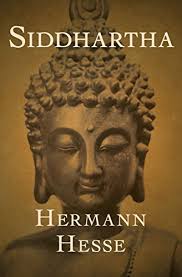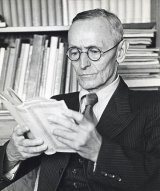Siddhartha Page #4
Siddhartha is a novel by Hermann Hesse that deals with the spiritual journey of self-discovery of a man named Siddhartha during the time of the Gautama Buddha. The book, Hesse's ninth novel, was written in German, in a simple, lyrical style.
Quoth Govinda: "Siddhartha is putting me on. How could you have learned meditation, holding your breath, insensitivity against hunger and pain there among these wretched people?" And Siddhartha said quietly, as if he was talking to himself: "What is meditation? What is leaving one's body? What is fasting? What is holding one's breath? It is fleeing from the self, it is a short escape of the agony of being a self, it is a short numbing of the senses against the pain and the pointlessness of life. The same escape, the same short numbing is what the driver of an ox-cart finds in the inn, drinking a few bowls of rice-wine or fermented coconut-milk. Then he won't feel his self any more, then he won't feel the pains of life any more, then he finds a short numbing of the senses. When he falls asleep over his bowl of rice-wine, he'll find the same what Siddhartha and Govinda find when they escape their bodies through long exercises, staying in the non-self. This is how it is, oh Govinda." Quoth Govinda: "You say so, oh friend, and yet you know that Siddhartha is no driver of an ox-cart and a Samana is no drunkard. It's true that a drinker numbs his senses, it's true that he briefly escapes and rests, but he'll return from the delusion, finds everything to be unchanged, has not become wiser, has gathered no enlightenment,--has not risen several steps." And Siddhartha spoke with a smile: "I do not know, I've never been a drunkard. But that I, Siddhartha, find only a short numbing of the senses in my exercises and meditations and that I am just as far removed from wisdom, from salvation, as a child in the mother's womb, this I know, oh Govinda, this I know." And once again, another time, when Siddhartha left the forest together with Govinda, to beg for some food in the village for their brothers and teachers, Siddhartha began to speak and said: "What now, oh Govinda, might we be on the right path? Might we get closer to enlightenment? Might we get closer to salvation? Or do we perhaps live in a circle-- we, who have thought we were escaping the cycle?" Quoth Govinda: "We have learned a lot, Siddhartha, there is still much to learn. We are not going around in circles, we are moving up, the circle is a spiral, we have already ascended many a level." Siddhartha answered: "How old, would you think, is our oldest Samana, our venerable teacher?" Quoth Govinda: "Our oldest one might be about sixty years of age." And Siddhartha: "He has lived for sixty years and has not reached the nirvana. He'll turn seventy and eighty, and you and me, we will grow just as old and will do our exercises, and will fast, and will meditate. But we will not reach the nirvana, he won't and we won't. Oh Govinda, I believe out of all the Samanas out there, perhaps not a single one, not a single one, will reach the nirvana. We find comfort, we find numbness, we learn feats, to deceive others. But the most important thing, the path of paths, we will not find." "If you only," spoke Govinda, "wouldn't speak such terrible words, Siddhartha! How could it be that among so many learned men, among so many Brahmans, among so many austere and venerable Samanas, among so many who are searching, so many who are eagerly trying, so many holy men, no one will find the path of paths?" But Siddhartha said in a voice which contained just as much sadness as mockery, with a quiet, a slightly sad, a slightly mocking voice: "Soon, Govinda, your friend will leave the path of the Samanas, he has walked along your side for so long. I'm suffering of thirst, oh Govinda, and on this long path of a Samana, my thirst has remained as strong as ever. I always thirsted for knowledge, I have always been full of questions. I have asked the Brahmans, year after year, and I have asked the holy Vedas, year after year, and I have asked the devote Samanas, year after year. Perhaps, oh Govinda, it had been just as well, had been just as smart and just as profitable, if I had asked the hornbill-bird or the chimpanzee. It took me a long time and am not finished learning this yet, oh Govinda: that there is nothing to be learned! There is indeed no such thing, so I believe, as what we refer to as `learning'. There is, oh my friend, just one knowledge, this is everywhere, this is Atman, this is within me and within you and within every creature. And so I'm starting to believe that this knowledge has no worser enemy than the desire to know it, than learning." At this, Govinda stopped on the path, rose his hands, and spoke: "If you, Siddhartha, only would not bother your friend with this kind of talk! Truly, you words stir up fear in my heart. And just consider: what would become of the sanctity of prayer, what of the venerability of the Brahmans' caste, what of the holiness of the Samanas, if it was as you say, if there was no learning?! What, oh Siddhartha, what would then become of all of this what is holy, what is precious, what is venerable on earth?!" And Govinda mumbled a verse to himself, a verse from an Upanishad: He who ponderingly, of a purified spirit, loses himself in the meditation of Atman, unexpressable by words is his blissfulness of his heart. But Siddhartha remained silent. He thought about the words which Govinda had said to him and thought the words through to their end. Yes, he thought, standing there with his head low, what would remain of all that which seemed to us to be holy? What remains? What can stand the test? And he shook his head. At one time, when the two young men had lived among the Samanas for about three years and had shared their exercises, some news, a rumour, a myth reached them after being retold many times: A man had appeared, Gotama by name, the exalted one, the Buddha, he had overcome the suffering of the world in himself and had halted the cycle of rebirths. He was said to wander through the land, teaching, surrounded by disciples, without possession, without home, without a wife, in the yellow cloak of an ascetic, but with a cheerful brow, a man of bliss, and Brahmans and princes would bow down before him and would become his students. This myth, this rumour, this legend resounded, its fragrants rose up, here and there; in the towns, the Brahmans spoke of it and in the forest, the Samanas; again and again, the name of Gotama, the Buddha reached the ears of the young men, with good and with bad talk, with praise and with defamation. It was as if the plague had broken out in a country and news had been spreading around that in one or another place there was a man, a wise man, a knowledgeable one, whose word and breath was enough to heal everyone who had been infected with the pestilence, and as such news would go through the land and everyone would talk about it, many would believe, many would doubt, but many would get on their way as soon as possible, to seek the wise man, the helper, just like this this myth ran through the land, that fragrant myth of Gotama, the Buddha, the wise man of the family of Sakya. He possessed, so the believers said, the highest enlightenment, he remembered his previous lives, he had reached the nirvana and never returned into the cycle, was never again submerged in the murky river of physical forms. Many wonderful and unbelievable things were reported of him, he had performed miracles, had overcome the devil, had spoken to the gods. But his enemies and disbelievers said, this Gotama was a vain seducer, he would spent his days in luxury, scorned the offerings, was without learning, and knew neither exercises nor self-castigation.
Translation
Translate and read this book in other languages:
Select another language:
- - Select -
- 简体中文 (Chinese - Simplified)
- 繁體中文 (Chinese - Traditional)
- Español (Spanish)
- Esperanto (Esperanto)
- 日本語 (Japanese)
- Português (Portuguese)
- Deutsch (German)
- العربية (Arabic)
- Français (French)
- Русский (Russian)
- ಕನ್ನಡ (Kannada)
- 한국어 (Korean)
- עברית (Hebrew)
- Gaeilge (Irish)
- Українська (Ukrainian)
- اردو (Urdu)
- Magyar (Hungarian)
- मानक हिन्दी (Hindi)
- Indonesia (Indonesian)
- Italiano (Italian)
- தமிழ் (Tamil)
- Türkçe (Turkish)
- తెలుగు (Telugu)
- ภาษาไทย (Thai)
- Tiếng Việt (Vietnamese)
- Čeština (Czech)
- Polski (Polish)
- Bahasa Indonesia (Indonesian)
- Românește (Romanian)
- Nederlands (Dutch)
- Ελληνικά (Greek)
- Latinum (Latin)
- Svenska (Swedish)
- Dansk (Danish)
- Suomi (Finnish)
- فارسی (Persian)
- ייִדיש (Yiddish)
- հայերեն (Armenian)
- Norsk (Norwegian)
- English (English)
Citation
Use the citation below to add this book to your bibliography:
Style:MLAChicagoAPA
"Siddhartha Books." Literature.com. STANDS4 LLC, 2024. Web. 22 Dec. 2024. <https://www.literature.com/book/siddhartha_24>.




Discuss this Siddhartha book with the community:
Report Comment
We're doing our best to make sure our content is useful, accurate and safe.
If by any chance you spot an inappropriate comment while navigating through our website please use this form to let us know, and we'll take care of it shortly.
Attachment
You need to be logged in to favorite.
Log In